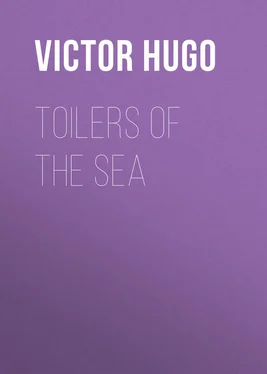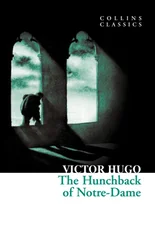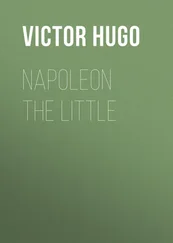Victor Hugo - Toilers of the Sea
Здесь есть возможность читать онлайн «Victor Hugo - Toilers of the Sea» — ознакомительный отрывок электронной книги совершенно бесплатно, а после прочтения отрывка купить полную версию. В некоторых случаях можно слушать аудио, скачать через торрент в формате fb2 и присутствует краткое содержание. Жанр: literature_19, foreign_antique, foreign_prose, на английском языке. Описание произведения, (предисловие) а так же отзывы посетителей доступны на портале библиотеки ЛибКат.
- Название:Toilers of the Sea
- Автор:
- Жанр:
- Год:неизвестен
- ISBN:нет данных
- Рейтинг книги:5 / 5. Голосов: 1
-
Избранное:Добавить в избранное
- Отзывы:
-
Ваша оценка:
- 100
- 1
- 2
- 3
- 4
- 5
Toilers of the Sea: краткое содержание, описание и аннотация
Предлагаем к чтению аннотацию, описание, краткое содержание или предисловие (зависит от того, что написал сам автор книги «Toilers of the Sea»). Если вы не нашли необходимую информацию о книге — напишите в комментариях, мы постараемся отыскать её.
Toilers of the Sea — читать онлайн ознакомительный отрывок
Ниже представлен текст книги, разбитый по страницам. Система сохранения места последней прочитанной страницы, позволяет с удобством читать онлайн бесплатно книгу «Toilers of the Sea», без необходимости каждый раз заново искать на чём Вы остановились. Поставьте закладку, и сможете в любой момент перейти на страницу, на которой закончили чтение.
Интервал:
Закладка:
Victor Hugo
Toilers of the Sea
INTRODUCTION
Victor Hugo was thinking much of Æschylus and his Prometheus at the time he conceived the figure of Gilliatt, heroic warrer with the elements. But it is to a creature of the Gothic mind like Byron's Manfred, and not to any earlier, or classic, type of the eternal rebellion against fate or time or circumstance, that Hugo's readers will be tempted to turn for the fellow to his Guernsey hero:
"My joy was in the wilderness – to breathe
The difficult air of the iced mountain's top,
Where the birds dare not build – nor insects wing
Flit o'er the herbless granite; or to plunge
Into the torrent, and to roll along
On the swift whirl of the new-breaking wave
Of river-stream, or ocean, in their flow."
The island of Guernsey was Gilliatt's Alp and sea-solitude, where he, too, had his avalanches waiting to fall "like foam from the round ocean of old Hell." And as Byron figured his own revolt against the bonds in Manfred, so Hugo, being in exile, put himself with lyrical and rhetorical impetuosity into the island marcou and child of destiny that he concocted with "a little sand and a little blood and a deal of fantasy" in the years 1864 and 1865. There is a familiar glimpse of the Hugo household to be had in the first winter of its transference to the Channel Islands, years before Les Travailleurs was written, which betrays the mood from which finally sprang this concrete fable of the man-at-odds. It was the end of November 1852, and a father and his younger son sat in a room of a house of Marine Terrace, Jersey – a plain, unpicturesque house; square, hard in outline, and newly whitewashed, – Methodism, said Hugo, in stones and mortar. Outside its windows the rain fell and the wind blew: the house was like a thing benumbed by the angry noise. The two inmates sat plunged in thought, possibly thinking of the sad significance of these beginnings of winter and of exile which had arrived together. At length the son (François Hugo) asked the father what he meant to do during their exile, which he had already predicted would be long? The father said, "I shall look at the sea." Then came a silence, broken by a question as to what the son would do? To which he replied that he would translate Shakespeare.
Victor Hugo's own study or eulogy of Shakespeare was written as a preamble to his son's translation of the plays. It is not too much to connect the new and ample creative work that followed, including his great novel of Revolution, Les Misérables , and his poems in La Légende des Siècles (first series) with the double artistic stimulus gained from this conditioned solitude and his closer acquaintance with the dramatic mind of that "giant of the great art of the ages," as he termed our English poet in the book already quoted from.
The Shakespeare book is dated from Hauteville House, 1864. Les Travailleurs from the same quarters, March 1866. The Hugos had perforce suddenly left Jersey for Guernsey in 1855, owing to the gibes and flouts of an unlucky revolutionary Jersey journal, L'Homme , at the two governments: Victor Hugo being already a marked man for his pains. The Guernsey house he inhabited for so many years had a spacious study in its upper story, with a large window, free to the sun and to the sea. Here he wrote, tirelessly, tremendously, as his custom was: beginning betimes in the early morning, and writing on till the time for his déjeuner : standing at a tall desk to write in his sea-tower. You must turn to certain of his poems and to the pages of Les Misérables and Les Travailleurs for the mental colours and phantasmagoria of those days and years.
It would be easy to point out, resuming an immense amount of criticism of his romances and of this story in particular, the defects on the side of dramatic and true life-likeness to be found in Hugo's prose-narrative. But it is more helpful in turning to a story-book to know what has been said unreservedly in its favour. Hugo's greatest appreciator was superlative in his praise, and it need hardly be explained that it was Swinburne who brought his tribute to the romance of Gilliatt also, after positing the parallel claims of Hugo's five chief romances. Of the five, they were not, he said, to be comparatively classified in order of merit. "But I may perhaps be permitted to say without fear of deserved rebuke that none is to me personally a treasure of greater price than Les Travailleurs de la Mer . The splendid energy of the book makes the superhuman energy of the hero seem not only possible but natural, and his triumph over all physical impossibilities not only natural but inevitable." Swinburne's love for the Channel Islands, and his poems inspired by them, were mainly due as we know to Hugo's life and his books lived and written there.
E.R.The following is a list of the chief publications of Victor Hugo: —
Poetical Works: – Nouvelles Odes, 1824; Odes et Poésies Diverses, 1822; Odes et Ballades, 1826; Les Orientales, 1829; Feuilles d'Automne, 1831; Les Chants du Crépuscule, 1835; Les Voix Intérieures, 1837; Les Rayons et les Ombres, 1840; Odes sur Napoléon, 1840; Les Châtiments, 1853; Les Contemplations, 1856; La Légende des Siècles (1st part), 1859; Les Chansons des Rues et des Bois, 1865; L'Année Terrible, 1872; La Légende des Siècles (2nd part), 1877; L'Art d'être Grand-père, 1877; Le Pape, 1878; La Pitié Suprême, 1879; L'Âne, 1880; Religion et Religions, 1880; Les Quatre Vents de l'Esprit, 1881; La Légende des Siècles (3rd part), 1883.
Dramatic Works: – Cromwell, 1827; Amy Robsart, 1828; Hernani, 1830; Marion Delorme, 1831; Le Roi s'amuse, 1832; Lucrèce Borgia, 1833; Marie Tudor, 1833; Angelo, Tyran de Padoue, 1835; La Esmeralda (libretto for Opera), 1836; Ruy Blas, 1838; Burgraves, 1843; Torquemada, 1882.
Novels and other Prose Works: – Hans d'Islande, 1823; Bug-Jargal (enlarged for book form), 1826; Le Dernier Jour d'un Condamné, 1829; Notre-Dame de Paris, 1831; Étude sur Mirabeau, 1834; Claude Gueux, 1834; Le Rhin, 1842; Napoléon le Petit, 1852; Les Misérables, 1862; Littérature et Philosophie mélées, 1864; William Shakespeare, 1864; Les Travailleurs de la Mer, 1866; L'Homme qui rit, 1869; Actes et Paroles, 1872; Quatre-Vingt-Treize, 1873; Histoire d'un Crime, 1877; Discours pour Voltaire, 1878; Le Domaine public payant, 1878; L'Archipel de la Manche, 1883.
Hugo left a mass of manuscripts, of which some have been published since his death: – Le Théatre en Liberté, La Fin de Satan, Dieu, Choses Vues, Tonte la Lyre, Océan, En Voyage, Postscriptum de ma Vie.
An Edition Définitive of his works in 48 volumes was published 1880-5.
Translations: – Of novels, 28 vols., 1895, 1899, etc.; of dramas, by I.G. Burnham, 1895. Separate translations of prose and poetical works.
Life: – Among the biographies and appreciations are: – Sainte-Beuve, Biographie des Contemporains, vol. iv., 1831; Portraits Contemporains, vol. i., 1846; Victor Hugo raconté par un témoin de sa vie (Madame Hugo), 1863; A. Barbou, 1880 (trans. 1881); E. Biré, Victor Hugo avant 1830, 1883; après 1830, 1891; après 1852, 1894; F.W.H. Myers, Essays, 1883; Paul de Saint Victor, 1885, 1892; Alfred Asseline, Victor Hugo intime, 1885; G.B. Smith, 1885; J. Cappon, A Memoir and a Study, 1885; A.C. Swinburne, A Study of Victor Hugo, 1886; E. Dupuy, Victor Hugo, l'homme et le poète, 1886; F.T. Marzials (Great Writers), 1888; Charles Renouvier, Victor Hugo le Poète, 1892; L. Mabilleau, 1893; J.P. Nichol, 1893; C. Renouvier, Victor Hugo le Philosophe, 1900; E. Rigal, 1900; G.V. Hugo, Mon Grand-père, 1902; Juana Lesclide, Victor Hugo intime, 1902; Theophile Gautier, 1902; F. Gregh, Étude sur Victor Hugo, 1905; P. Stapfers, Victor Hugo à Guernsey, 1905.
Читать дальшеИнтервал:
Закладка:
Похожие книги на «Toilers of the Sea»
Представляем Вашему вниманию похожие книги на «Toilers of the Sea» списком для выбора. Мы отобрали схожую по названию и смыслу литературу в надежде предоставить читателям больше вариантов отыскать новые, интересные, ещё непрочитанные произведения.
Обсуждение, отзывы о книге «Toilers of the Sea» и просто собственные мнения читателей. Оставьте ваши комментарии, напишите, что Вы думаете о произведении, его смысле или главных героях. Укажите что конкретно понравилось, а что нет, и почему Вы так считаете.












